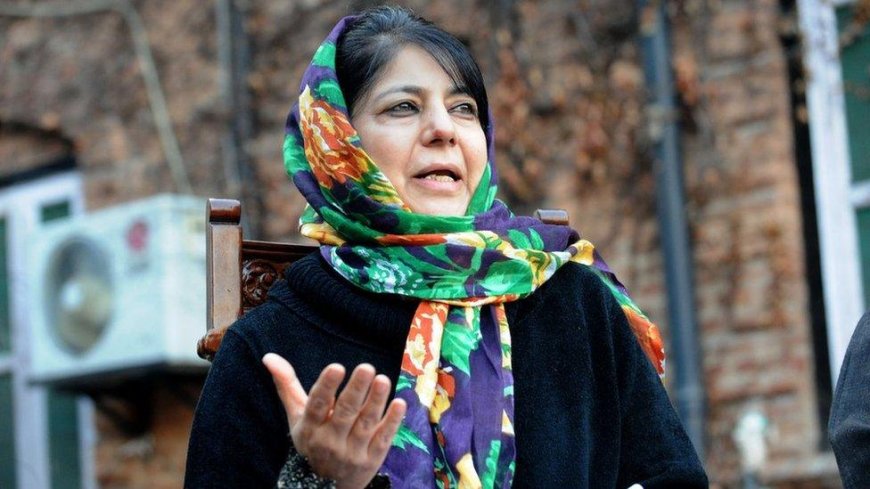Mehbooba Mufti Proposes Comprehensive Rehabilitation Plan for Kashmiri Pandits Amid Renewed Calls for Return
PDP chief Mehbooba Mufti unveils a detailed plan for the safe return and rehabilitation of Kashmiri Pandits in the Valley, advocating for inclusive policymaking and community engagement.

Srinagar, June 3, 2025 — In a significant and emotionally charged political development, Peoples Democratic Party (PDP) president Mehbooba Mufti has proposed a detailed rehabilitation plan for the Kashmiri Pandit community, who were displaced from the Valley during the militancy of the 1990s. The proposal is being viewed as a major step forward in fostering reconciliation, rebuilding trust, and creating a sustainable roadmap for the return of the displaced community to their homeland.
The announcement comes at a time when the discourse around the resettlement of Kashmiri Pandits has once again taken center stage in national politics, following widespread appeals from civil society and diaspora groups for a just and secure return mechanism.
Key Highlights of the Rehabilitation Plan
Unveiling the proposal at a press briefing in Srinagar, Mehbooba Mufti said the plan was shaped after extensive consultations with community leaders, security experts, and civil society organizations. Here are the core components of the plan:
-
Community-Led Reintegration Initiatives
Mufti emphasized a "dignified return" facilitated through local community engagement rather than isolated housing colonies. This model encourages mixed habitation, which she believes is essential for long-term integration. -
Dedicated Security Protocols
A separate security grid would be created for returnee families in vulnerable zones, in coordination with the Jammu and Kashmir Police and the Indian Army, ensuring protection without ghettoization. -
Special Economic and Employment Zones
The plan proposes exclusive economic zones and employment incentives for Pandits returning to the Valley. These zones would provide government-subsidized setups for entrepreneurs and skilled workers, supported by schemes under the Ministry of Minority Affairs. -
Psychosocial Support and Education Grants
Recognizing decades of trauma, the proposal includes counseling services, trauma recovery programs, and education scholarships for displaced youth—funded in part by the Jammu & Kashmir Relief and Rehabilitation Department. -
Cultural Reconnection Programmes
To foster mutual trust, the PDP suggests launching inter-community dialogue forums, cultural exchanges, and heritage site restoration projects across Kashmir, including temples, shrines, and old Pandit settlements.
Mehbooba Mufti’s Statement: “Justice Must Be Inclusive”
Speaking candidly at the press conference, Mufti said:
“The pain of Kashmiri Pandits is real, and so is the grief of Muslims who suffered during the conflict. A true healing process must include every voice and every wound. We propose this plan not as a political stunt, but as a promise of reconciliation.”
She also criticized past rehabilitation efforts as being “tokenistic and bureaucratic,” stating that they have failed to address the emotional and social dimensions of displacement.
Background: The Pandit Exodus and Years of Delay
The exodus of Kashmiri Pandits from the Valley in the early 1990s remains one of the darkest chapters in modern Indian history. Over 60,000 families were displaced, many of whom continue to live in temporary camps in Jammu, Delhi, and elsewhere.
Though several governments have announced rehabilitation packages—like the Prime Minister’s Development Package (PMDP) and Return and Rehabilitation Scheme of 2008—most have been either underutilized or stalled. A 2023 report by the Centre for Policy Research highlighted that less than 15% of the intended beneficiaries returned under the previous schemes.
Political and Public Reactions
While the PDP’s proposal has been welcomed by several Kashmiri Pandit advocacy groups, others remain skeptical about its feasibility without central government backing.
Sanjay Tickoo, president of the Kashmiri Pandit Sangharsh Samiti (KPSS), responded cautiously:
“It’s refreshing to hear a comprehensive plan from a regional leader. But unless implemented with transparency and backed by central funding, such announcements often fade into silence.”
The BJP’s J&K unit, however, accused Mufti of playing to the gallery, stating that the government has already invested heavily in the safe return of Pandits through the Kashmir Migrant Rehabilitation Scheme.
In contrast, civil society groups like Citizens for Justice and Peace (CJP) and The Dialogue Project have urged the Centre to engage constructively with Mufti’s proposal, calling it a rare effort at community-centric reconciliation.
What Happens Next?
The PDP has announced it will soon submit the formal proposal to Prime Minister Narendra Modi and Union Home Minister Amit Shah, seeking integration with existing central programs.
The state unit of the National Commission for Minorities has also been approached to evaluate the viability of trauma counseling, employment integration, and cultural restoration aspects of the plan.
The proposal is expected to be tabled in the upcoming Jammu & Kashmir Legislative Assembly session, which will be closely watched by policy analysts and displaced communities alike.
Final Thoughts
Mehbooba Mufti’s proposal marks a rare and constructive intervention in one of India’s most sensitive and unresolved humanitarian issues. By proposing a multi-dimensional roadmap—with security, economics, psychosocial healing, and cultural integration—the PDP has taken a bold step toward rewriting a narrative that has remained stagnant for decades.
Whether this plan gathers bipartisan support or fades amid political cynicism remains to be seen. But what’s clear is that the conversation around the return of Kashmiri Pandits is back—and this time, it demands more than slogans.


















































